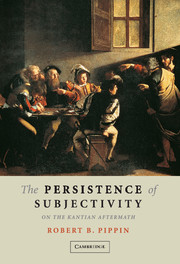Book contents
- Frontmatter
- Contents
- Acknowledgments
- The Persistence of Subjectivity
- 1 Introduction: “Bourgeois Philosophy” and the Problem of the Subject
- PART I SETTING
- PART II THEORISTS
- PART III MODERN MORES
- PART IV EXPRESSION
- 12 “The Force of Felt Necessity”: Literature, Ethical Knowledge, and Law
- 13 What Was Abstract Art? (From the Point of View of Hegel)
- 14 On “Becoming Who One Is” (and Failing): Proust's Problematic Selves
- Bibliography
- Name Index
- Subject Index
12 - “The Force of Felt Necessity”: Literature, Ethical Knowledge, and Law
Published online by Cambridge University Press: 05 June 2012
- Frontmatter
- Contents
- Acknowledgments
- The Persistence of Subjectivity
- 1 Introduction: “Bourgeois Philosophy” and the Problem of the Subject
- PART I SETTING
- PART II THEORISTS
- PART III MODERN MORES
- PART IV EXPRESSION
- 12 “The Force of Felt Necessity”: Literature, Ethical Knowledge, and Law
- 13 What Was Abstract Art? (From the Point of View of Hegel)
- 14 On “Becoming Who One Is” (and Failing): Proust's Problematic Selves
- Bibliography
- Name Index
- Subject Index
Summary
By now, the “law and literature” topic has come to include a wide array of issues. One might consider the literary treatment of law and lawyers in literature, mostly in novels and plays, and one might thereby learn something about the socio-historical status of the legal profession and the everyday understanding of how the law works (or does not) from studying such works. (Dickens's novel Bleak House is probably the most obvious example.) Literature itself raises a number of problems for the law, and so the law's regulation of literature might form a natural subdiscipline. (Intellectual property law and copyright issues would be clear instances.) One might study the literary style of judicial opinions, with an eye toward understanding the rhetoric of famously persuasive decisions or toward understanding the distinctive style that sets apart a certain legal school of thought, perhaps more clearly than do legal principles.
But there are two issues of greatest philosophical interest. Most people would concede that the law itself must be interpreted in order to be effectively applied, and this has seemed to many to open the door to a broad set of controversial issues concerned with theories of interpretation. According to some in the “Law and Literature” movement, written statutes and constitutions are texts and like texts are often ambiguous and vague and subject to multiple possible readings, perhaps, so goes the suggestion, like literary texts.
- Type
- Chapter
- Information
- The Persistence of SubjectivityOn the Kantian Aftermath, pp. 261 - 278Publisher: Cambridge University PressPrint publication year: 2005



